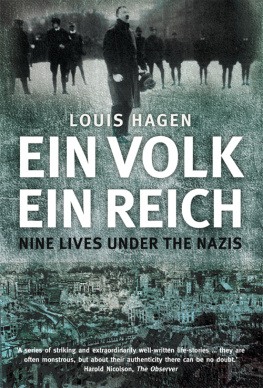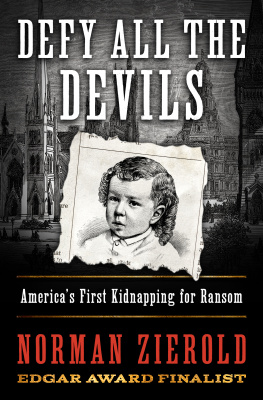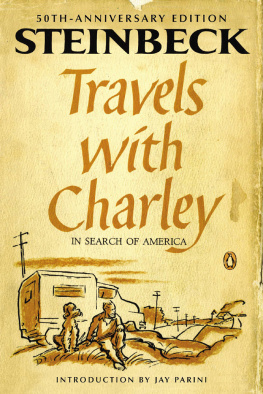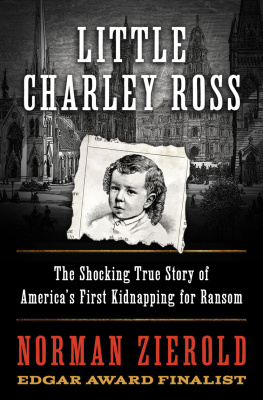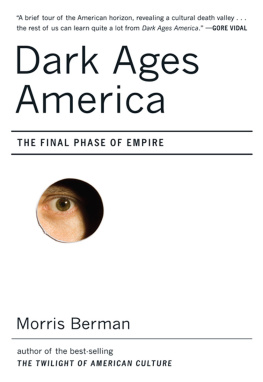This edition first published in the United States in 2011 by
The Overlook Press, Peter Mayer Publishers, Inc.
141 Wooster Street
New York, NY 10012
www.overlookpress.com
For bulk and special sales, please contact sales@overlookny.com
Copyright 2011 by Carrie Hagen
All rights reserved. No part of this publication may be reproduced or transmitted in any form or by any means, electronic or mechanical, including photocopy, recording, or any information storage and retrieval system now known or to be invented, without permission in writing from the publisher, except by a reviewer who wishes to quote brief passages in connection with a review written for inclusion in a magazine, newspaper, or broadcast.
ISBN: 978-1-59020-896-0
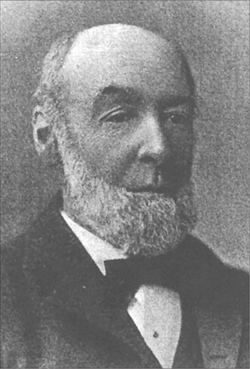
Christian Ross.
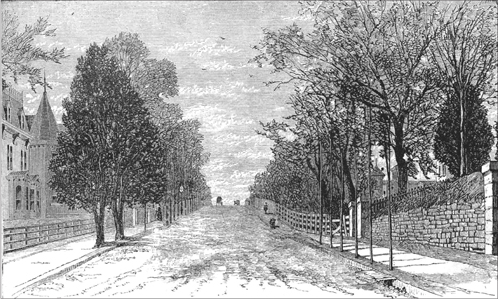
Washington Lane, 1876
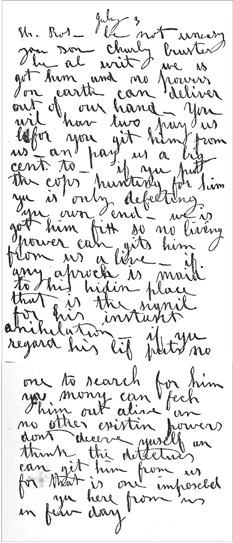
The first ransom letter
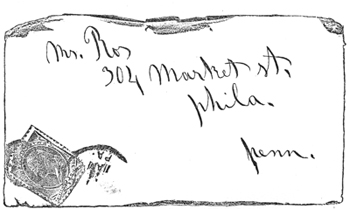
The first ransom envelope
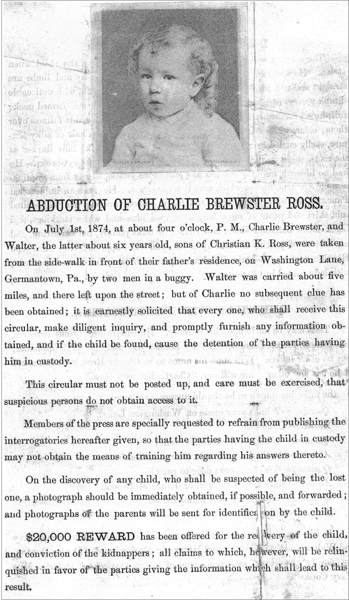
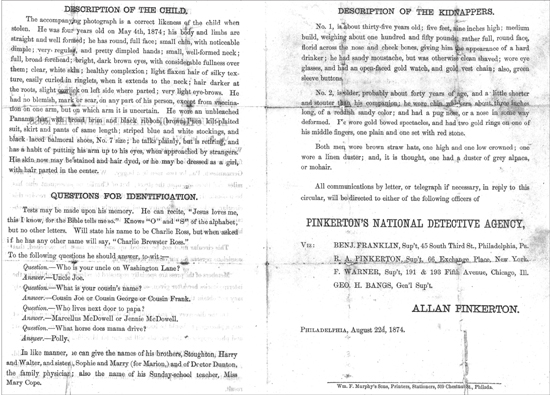
First page of Pinkerton pamphlet sent to police across America
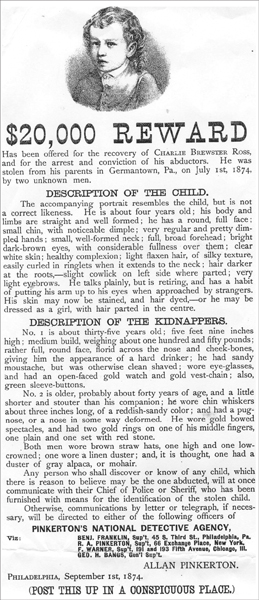
Pinkerton flyer, as posted in public places
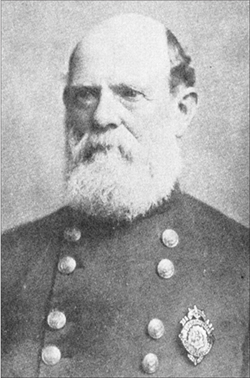
Superintendent George W. Walling
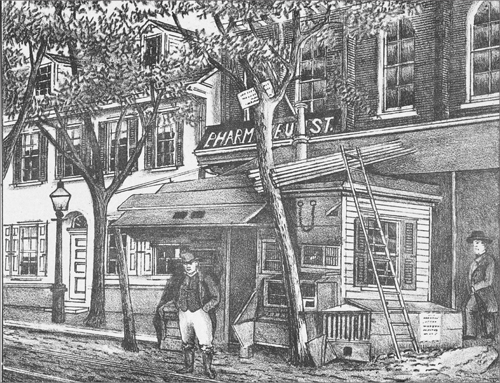
Main Street (Germantown Avenue) at Rittenhouse
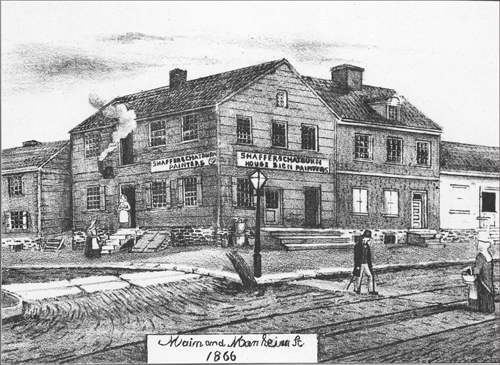
Main Street at Manheim
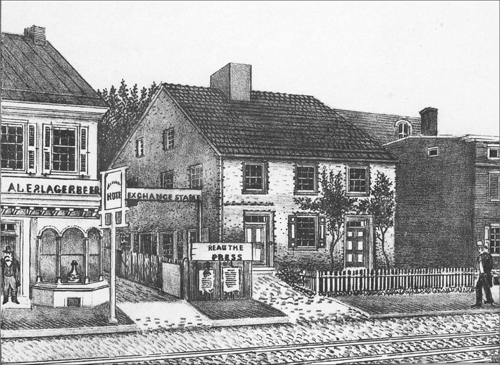
Main Street life
to a different Charley,
who loved this city
and to Jeff,
who loves it now
T HIS IS A WORK OF NONFICTION. A NY DETAIL THAT IS NOT common knowledge to students of this case and culture has a corresponding endnote. Any word within quotation marks is taken from memoir, newspaper report, trial transcript, or family paper. Certain geographical locations of importance to this story have undergone name changes over the past 137 years. Unless otherwise indicated in an endnote, I use the location names known to 1874.
C HARLEY AND W ALTER R OSS
Brothers, ages 4 and 5, kidnapped from their front yard on July 1, 1874. The same evening, Walter is released and returned home.
C HRISTIAN R OSS
The boys father, a failing businessman caught between loyalty to his family and obedience to the police. After initially leading the search to find his son, Christian is targeted by the press when Philadelphias city leaders convince him not to pay the ransom.
T HE L EWIS B ROTHERS
Christian Rosss neighbors, brothers-in-law, and wealthy merchants. The Lewis brothers represent the family in the investigation when Christian collapses. Frustrated with libel and police incompetence, the brothers disregard the advice of city leaders in November 1874 and negotiate an exchange with the kidnappers on their own terms.
W ILLIAM M CKEAN AND THE A DVISERS
A powerful group of Philadelphia council and businessmen, leaders of Philadelphias chapter of the Republican Ring. Eager to promote the Centennial Exhibition and determined to retain their offices in the November 1874 election, these men do what they can to keep news of Charleys kidnapping from the press. One well-known member is William McKean, editor of the Philadelphia Public Ledger.
M AYOR S TOKLEY
Philadelphia mayor and figurehead of the citys Republican Ring. Responsible to the Republican advisers, Stokley is concerned with his public approval ratings once his constituents blame him and his force for running an incompetent investigation.
W ILLIAM M OSHER
One of the two kidnappers, a forty-something river pirate and career criminal. Raised in Brooklyn, Mosher lives in Philadelphia with his wife and three sons under the name of Henderson. While on a peddling trip to Germantown, Mosher and his criminal apprentice Joseph Douglas see the Ross boys. Assuming the boys father is a wealthy man and will immediately pay any ransom amount, they take the children.
J OSEPH D OUGLAS
The second kidnapper, a younger man of twenty-eight. After serving a prison sentence for burglary, Douglas works as a streetcar conductor in Manhattan until Mosher finds and entices him to move to Philadelphia. Less conspicuous and more emotionally stable than his mentor, Douglas seeks to cut ties with Mosher once newspapers print their descriptions and Christian Ross refuses to pay the ransom.
W ILLIAM W ESTERVELT
Brother-in-law of William Mosher and a former police officer. In July 1874, bartenders in New Yorks Five Points neighborhood notice Westervelt meeting with two men that fit newspaper accounts of Charley Rosss kidnappers. Westervelt becomes a police informant early in the investigation, but unbeknownst to the NYPD, he also acts as a double agent, informing the kidnappers of police activity.
S UPERINTENDENT G EORGE W ALLING
A career officer and head of the New York Police Department. Walling assumes a main role in the case soon after Mayor Stokley announces Philadelphias $20,000 reward for information, when Gil Mosher, Williams brother, arrives in his office with suspicions of his brothers involvement. When Walling realizes the connection between his former officer William Westervelt and William Mosher, he offers Westervelt his old job back in exchange for spying on his brother-inlaws activities.
C APTAIN H EINS
One of the first Philadelphia officers put on the case. Heinss loyalty to the Ross family irritates Mayor Stokley and the Republican advisers, who suspect Heins is withholding information from them. The captain closely communicates with Walling throughout the summer of 1874, until he suspects William Westervelts intentions and warns the superintendent against working with the informant. In the spring of 1875, Heins demands that Walling turn Westervelt over to the Philadelphia Police.
T HE R ANSOM N OTES
The voice of the kidnappers. Appearing in excerpts throughout the first two sections of the narrative, these notes direct Christian Ross to communicate his plans through personal advertisements; once this occurs, the chronological placement of the letters and the ads creates a conversation between the criminals and the family.
T HE N EWSPAPERS
The voice of the public. The narrative integration of excerpts from the New York Herald, the Philadelphia Public Ledger


